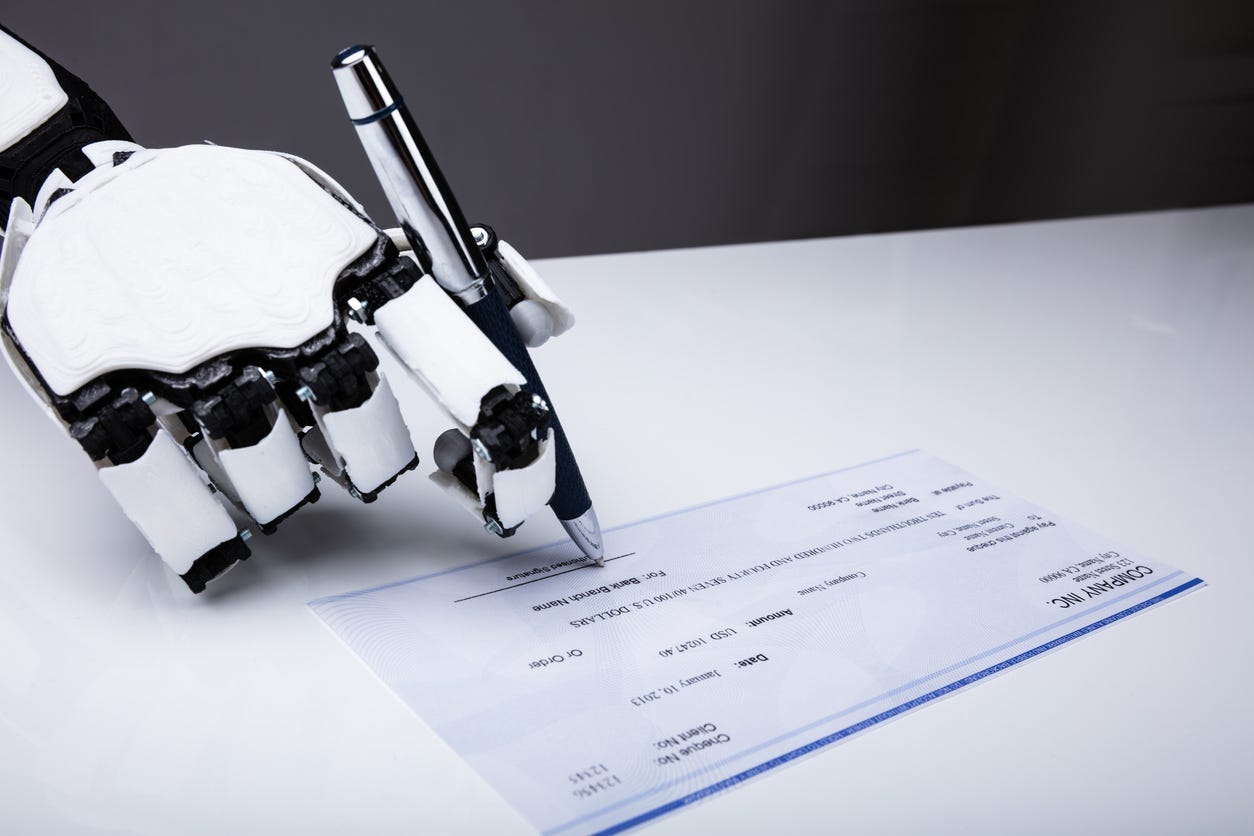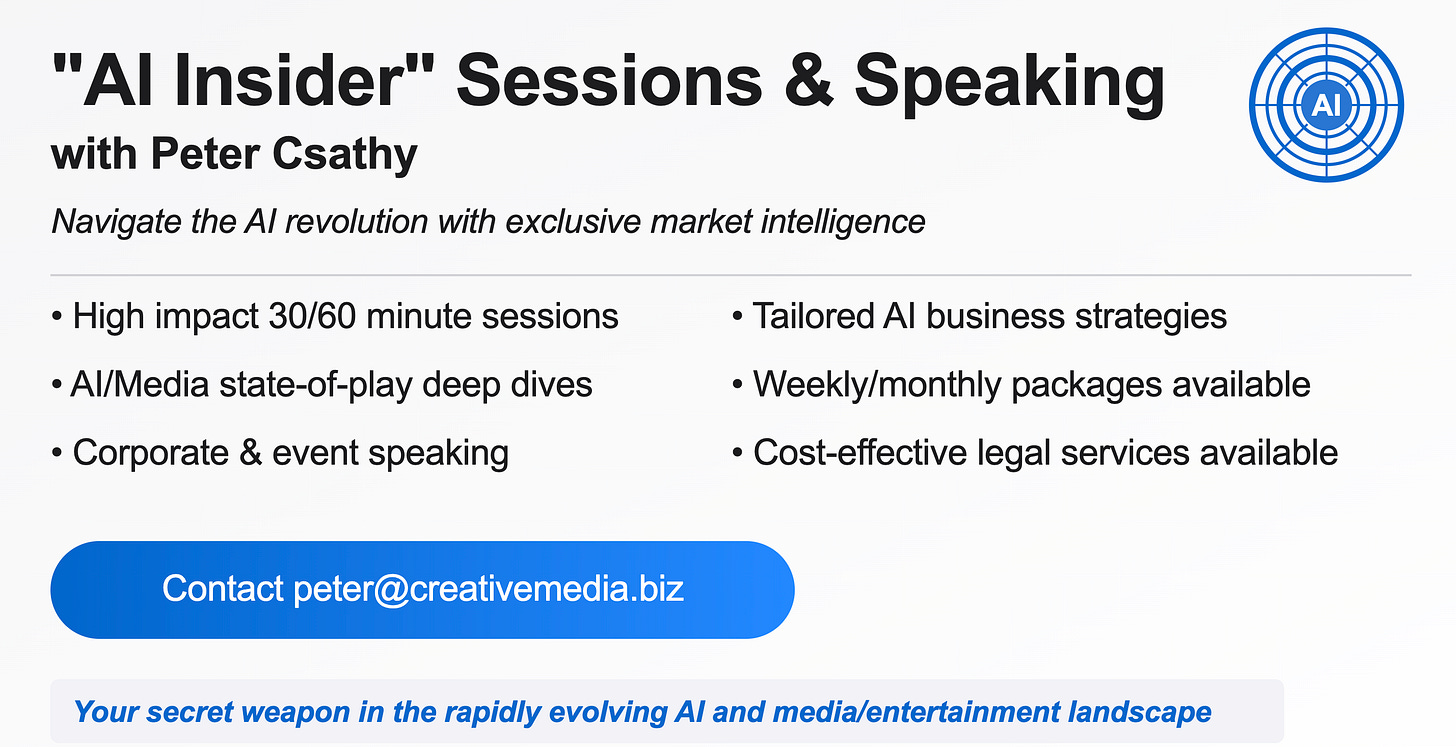Compulsory Content Licensing For GenAI. Now, THAT's Fair Use!
Cloudflare Shows The Way (As YouTube Content ID & Music PRO's Did Before)

Yes, you caught me. I took one week off for the 4th of July after back-to-back emergency “fair use” posts. But my now well-rested “brAIn” is back! The “mAIn event” features my case for an “opt in” compulsory content licensing solution for generative AI (and Cloudflare points the way). Then, the “Video of the Week” — a recent “AI in Film” expert panel discussion worth watching (I participated). Finally, the “AI Litigation Tracker” — updates on key generative AI infringement cases by Partner Avery Williams of McKool Smith (access the “Tracker” here via this link). Obviously, we just received two ground-breaking “fair use” bangers!
But First …
On that note, listen to my recent emergency podcast about those blockbuster “fair use” court decisions in Kadrey v. Meta and Bartz v. Anthropic. I generated them by feeding my exclusive deep dive analysis into Google NotebookLM — and the result is a compelling, engaging, and informative multi-layered episode that’s worth checking out. Below is the link on Apple Podcasts. But you can find my “the brAIn” pod on all podcast platforms.
I. The mAIn Event - A Case for “Opt In” Compulsory Licensing for AI Training
Several weeks ago, I laid out the case for a fair and workable 3-tiered AI content licensing solution. Today I flesh out “Tier 3” — an automated and practical “opt in” system a la YouTube’s Content ID that can work right now via Cloudflare.
But first, before I get to the Cloudflare solution, let me lay out the problem it solves.
AI’s Big, Massive Tent - $1 Trillion Strong
As I recently wrote, OpenAI’s latest AI model enables all of us to be “professional” visual artists. And so, millions of people around the world immediately used it to impersonate (co-opt?) famed anime artist Hayao Miyazaki, generating millions of Miyazaki’s without his consent (let alone compensation). But it’s not just Miyazaki, of course. OpenAI made it drop dead easy to never need to hire and pay visual artists ever again.
Well, actually, not quite. You still need to pay someone. But that “someone” is Altman and OpenAI here. In fact, ChatGPT “in app” subscription revenue and app downloads reached an all time high during the initial Miyazaki stampede. So there’s that.
And then there’s this. OpenAI recently announced a fresh round of $40 billion at a $300 billion valuation to fuel Altman’s AI utopia. So money certainly isn’t the problem. It’s hard to argue with that cold hard fact when AI developers are expected to spend $1 trillion on tech infrastructure. And it’s also hard for me to hear the AI industry bemoaning — as I just recently did once from an AI licensing exec — that a major studio had the gall of asking for a $1 billion licensing fee. $1 billion of $1 trillion seems pretty damn reasonable to me (that’s 00.1% ). So demanding!
Instead of bemoaning, why not bring creators into AI’s massive tent and share at least some of that wealth in the name of content licensing instead of content “taking”?
The Tech To Track & Pay Creators Exists
The AI tech necessary to track specific prompts (like Miyazaki’s) — and either stop them from generating specific Artist outputs, or at least trigger mandatory payments to the Artist — exists right now. When I prompt ChatGPT to generate an image of “Sam Altman taking an artist’s money,” for example (which I recently did), ChatGPT refuses. “I can’t create that image,” it tells me. And if ChatGPT can protect its fearless leader Sam, OpenAI surely has the power to stop Miyazaki madness and protect Artists too.
Enter Compulsory Licensing (via Cloudflare & Others) — The “Miyazaki Solution”
Let’s set aside the separate issue of Artist consent for the moment, and focus on the compensation piece. OpenAI absolutely could — and should! — pay Artists like Miyazaki every time users ask ChatGPT to generate images in their bespoke style. After all, “creative democratization” doesn’t mean a free lunch. Otherwise, we’d still be living in the Napster piracy days of old (which clearly is what many in Silicon Valley long for, especially Meta CEO Mark Zuckerberg who continues to disparage and diminish the Creative Community).
How would this kind of automated “opt in” compulsory licensing solution work? Cloudfare believes it has the answer. The company just launched a new marketplace that lets Artists and websites charge AI bots for scraping their content. Cloudflare is already a monster in terms of its reach. Its cloud infrastructure serves a whopping 20% of the Internet. And Cloudflare already offered tools to web publishers to block AI crawling bots.
Now Cloudflare has taken its fascinating tech to its next logical step — not just block AI bots, but also give websites the ability to give permissions to AI crawlers in exchange for immediate micro-payments at prices the participating websites set themselves. It’s exactly the kind of workable compulsory content licensing solution that I’ve been looking for — and expecting. Here’s why, in the words of TechCrunch:
“At scale, Cloudflare’s marketplace is a big idea that could offer publishers a potential business model for the AI era … The launch of the marketplace comes at a time when news publishers are facing existential questions about how to reach readers, as Google Search traffic fades away and AI chatbots rise in popularity.”
I previously wrote at length about this existential threat facing all web publishers and the advertisers that serve them (here’s that earlier post, “AI’s Holy Sh*t! Moment”).
YouTube’s Content ID & Music PRO’s
Cloudflare follows a long line of solutions developed to solve other seemingly intractable content licensing problems in the world of tech.
Exhibit A: YouTube. Like most AI “products,” it too started as a mass infringement machine. But in response to entertainment industry pressure (i.e., litigation), Youtube “magically” was able to develop Its Content ID system that “continuously compares new [user] uploads to the references for [an Artist’s] assets. Matching videos are automatically claimed on behalf of the asset, and [the Artist’s] specified match policy is applied to the claimed videos before they are published on YouTube.” YouTube can legally permit copyrighted works to be used by its users only if the relevant copyright owner “opts in” to allow them to use their work. And if they do, then payments are triggered every time YouTube users use that copyrighted work.
Here’s Exhibit B: Compulsory licensing in music. In a scheme that still kinda’ surprises me in terms of its breadth, any Artist can “cover" (record) any other Artist’s songs without the need to directly negotiate a license or get consent. The songwriter automatically gets paid royalties when those “covers” generate royalties.
Compulsory Licensing Is Just One Part Of My Proposed 3-Tier Content Licensing Solution
Compulsory AI licensing is just one part of my proposed broader, ethical, and legally-permissible three-tier content licensing solution for AI developers to get the content they need for their AI tech. Here’s what I have in mind.
Tier 1: 1-1 Direct Licenses Between Individual GenAI Developers & Individual Major Rights-Holders — media and entertainment companies with significant content libraries. OpenAI’s $250 million deal with News Corp is an example.
Tier 2: 1-1 Direct Licenses Between Individual GenAI Developers & Aggregated Rights-Holders — individual media and entertainment companies with smaller content libraries — who “pool” their assets to bring content scale and diversity. This is a “strength in numbers” approach.
Tier 3: Automated “Opt In” Platforms for All Other Individual Rights-Holders — smaller rights-holders who want to participate in the GenAI participation and monetization game. This is where Cloudflare and my “opt in” compulsory licensing solution fits in. It’s both practical (solving the AI training problem for both media and AI tech), and “do-able” (technically feasible) right now.
So, is the “will” there to make it happen?
My Magic 8-Ball says “Don’t count on it.”
But then again, as we are seeing in the reasoning of recent "fair use” legal decisions — especially Kadrey v. Meta — the courts may soon force that “will.”
II. Video of the Week: “AI & Film” Expert Panel
A couple weeks ago I joined Curt Doty’s “El sAIlon” webinar series, together with other leading voices in film and tech to explore AI’s expanding role in filmmaking. Others on the panel included VFX legend Scott Ross, former Microsoft CTO Andy Beach, and creator/technologist Mark Turner. Our conversation frequently got spicy as we debated whether AI in film is a collaborator or job killer, discussed hybrid workflows, explored the copyright conundrums, and dissected evolving entertainment industry business models (not to mention new creative possibilities).
Key themes included:
The rise of AI-native studios
IP ownership and legal minefields
Whether true artistry can be automated
The shift toward collaborative, hybrid workflows
Democratization vs. devaluation of creativity
Watch the interview via the link below. Think you’ll enjoy it.
III. AI Litigation Tracker: Updates on Key Generative AI/Media Cases (by McKool Smith)
Partner Avery Williams and the team at McKool Smith (named “Plaintiff IP Firm of the Year” by The National Law Journal) lay out the facts of — and latest critical developments in — the key GenAI-focused IP litigations below. All those detailed updates can be accessed via this link to the “AI Litigation Tracker”. McKool is a leader in both copyright and patent-related AI litigation — and all IP and general media, entertainment, AI and tech matters.
(1) Denial v. OpenAI & Microsoft
(2) Kadrey v. Meta
(3) Bartz v. Anthropic
(4) The New York Times v. Microsoft & OpenAI
(5) Disney & NBCUniversal v. Midjourney
(6) Thomson Reuters v. Ross Intelligence
(7) SDNY Multi-District Litigation
(8) Reddit v. Anthropic
(9) Dow Jones, et al. v. Perplexity AI
(10) UMG Recordings v. Suno
(11) UMG Recordings v. Uncharted Labs (d/b/a Udio)
(12) Universal Music Group, et al. v. Anthropic
(13) Getty Images v. Stability AI and Midjourney
(14) Sarah Anderson v. Stability AI
NOTE: Go to the “AI Litigation Tracker” tab at the top of “the brAIn” website for the full discussions and analyses of these and other key generative AI/media litigations. And reach out to me, Peter Csathy (peter@creativemedia.biz), if you would like to be connected to McKool Smith) to discuss these and other legal and litigation issues. I’ll make the introduction.
Want to Work Together?
Reach out to me at peter@creativemedia.biz.
About My Firm Creative Media
My firm and I represent media companies and rights-holders for generative AI content strategy and licensing, with deep relationships and market insights and intelligence second to none. We know the key players inside AI tech and pride ourselves in reaching THE key decision-makers and influencers in record time to execute. Not just talk. We specialize in breakthrough business development and M&A and cost-effective legal services in the worlds of media, entertainment, AI and tech.
Reach out to me at peter@creativemedia.biz to explore working with us.
Send your feedback to me and my newsletter via peter@creativemedia.biz.





